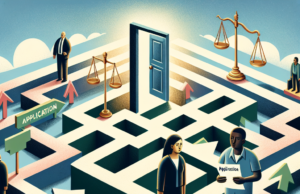Identification Cards for Illegal Aliens

Introduction
Identification cards for illegal aliens have been a topic of much debate in recent years. While some argue that providing identification cards to illegal immigrants may lead to increased security and safety, others fear that such a move would only encourage more illegal immigration. In this article, we will explore the pros and cons of identification cards for illegal aliens.
Pros of Identification Cards for Illegal Aliens
1. Increased Safety
Identification cards can provide a way for law enforcement officials to identify and track illegal immigrants who commit crimes within the United States. This can lead to increased safety for legal residents and immigrants alike.
2. Access to Social Services
Providing identification cards to illegal immigrants can give them access to social services such as healthcare, education, and housing. This can help illegal immigrants become more productive members of society and reduce the strain on local communities.
3. Improved Relations with Law Enforcement
By providing identification cards, illegal immigrants may be more willing to report crimes to law enforcement officials. This can help to improve relations between immigrants and law enforcement, leading to safer communities for everyone.
Cons of Identification Cards for Illegal Aliens
1. Encourages More Illegal Immigration
Some argue that providing identification cards to illegal immigrants would only encourage more illegal immigration. This could strain local resources and create tensions between legal residents and immigrants.
2. Security Concerns
Opponents of identification cards for illegal immigrants argue that such programs could lead to security concerns. Fraudulent identification cards could be used by terrorists or criminals to gain access to sensitive locations or information.
3. Legitimizes Illegal Immigration
Others argue that providing identification cards to illegal immigrants would legitimize their presence in the United States. This could lead to more lenient immigration policies and a disregard for the rule of law.
Conclusion
The debate over identification cards for illegal aliens is a complex issue with valid arguments on both sides. While identification cards could increase safety and access to social services for illegal immigrants, they could also encourage more illegal immigration and raise security concerns. Ultimately, any decision regarding identification cards for illegal aliens would require a comprehensive review of the potential pros and cons, as well as an understanding of the political and social ramifications of such a move.
It has been debated and argued that immigrant rights should not even exist for an illegal immigrant, as they have no legal authority to reside in the United States. Many politicians and organizations have released official statements declaring that giving illegal immigrants licenses and identification cards is actually a threat to national security and as such, should never be allowed.
Still others counter this, stating that giving an illegal immigrant the right to have an identification card or driver’s license. It has also been maintained that by extending immigrant rights to allow an illegal immigrant to have an identification card, police would have an easier time of locating and identifying people who either are unsure or are unable to communicate their identities; this would also apply to an illegal immigrant whom might falsely identify himself by claiming a name that is not consistent with the name on their identity card.
For the most part, it is generally agreed that any person over the age of 16 should have an identification card. In fact, in many states, being without some sort of identification is considered a misdemeanor. Yet, there are few cities and states that will grant identification cards and driver’s licenses to illegal immigrants.

















